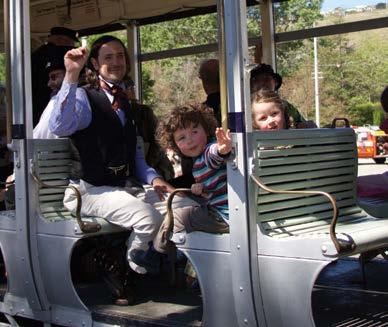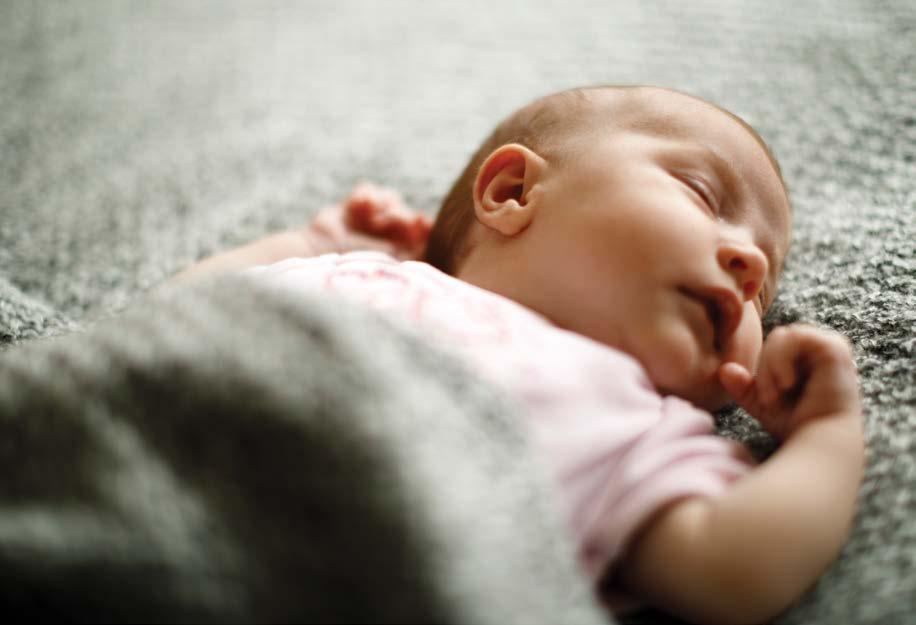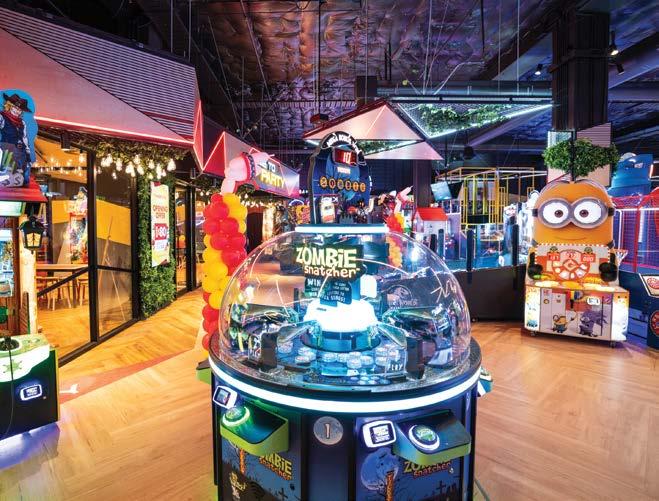
26 minute read
We love
Things we’re buzzing about



The biggest science centre in New Zealand is at Otago Museum! Forty-five hands-on interactives, including a three-storey slide, a bike-riding skeleton, and over a thousand butterflies in the Tropical Forest.
otagomuseum.nz
THE GREAT MUSEUM SANTA SEARCH AT CANTERBURY MUSEUM A selection of Santa statues are hiding in the display cases at Canterbury Museum. See if you can spot them all for the chance to score a super prize! The Santa Search happens every Christmas and is a sure-fire hit with young ones. It’s on from 7 December to 10 January at Canterbury Museum.

canterburymuseum.com
AN EARLY GIFT FROM SANTA Visit Santa at Northlands this Christmas and receive a free* book, Slinky Malinki’s Christmas Crackers, by New Zealand author, Lynley Dodd. Santa’s there every day from 10am all the way to Christmas Eve. *while stocks last.





northlands.co.nz
Introducing Little One's nappies! Exclusive to Countdown, they’re super absorbent and have a soft breathable lining to help your baby stay comfy and dry. Best of all, Little One’s are big on quality and low on price.
countdown.co.nz/littleones

Toddler Thursday at Ferrymead on 17th December
Toddler Thursday is a great day for making memories with your family. Bouncy castles, tram/train rides, ponies and much more all wrapped up in a one-off admission means a great family day out. Adults $15 Children $5 (6-15 yrs.) Children under 5 free.

Go Wild in Dunedin NZ FESTIVAL OF NATURE Seven jam-packed days of 22 - 28 April 2021 wild activities and outings for www.wilddunedin.nzall ages at the NZ Festival of Nature with guest
Photo: Joanna Livingston
Suzy Cato, 22 - 28 April.
Rewild yourself during the April 2021 holidays.
wilddunedin.nz
SLEEP SAFE, my baby
SIDS and Kids New Zealand is dedicated to saving the lives of babies and children during pregnancy, birth, infancy and childhood and supporting bereaved families. The organisation delivers on its vision through world-class research, evidence-based education and bereavement support, and advocacy.
Remind everyone who cares for your child:

Sleep baby on their back
Keep head and face uncovered
Keep baby smoke-free before and after birth
Safe sleeping environment night and day
Sleep baby in a safe cot in parents' room
SIDS and Kids provides a range of safe sleeping education and support services as well as a national 24-hour sudden infant death helpline
Stem cell storage – a potential lifesaver
Umbilical cord blood and tissue are touted as the ‘holy grail’ of stem cell therapy and research. Wellington mother, Luisa, takes comfort in knowing she can access a potentially lifesaving treatment for her family.
Luisa was pregnant with her second child when she discovered the possibility of storing cord blood. Cord blood and cord tissue are rich in powerful stem cells and can only be collected at birth for potential future use.
Stem cell-based treatments are approved for a wide range of diseases and conditions including various cancers, blood, immune and metabolic disorders. The number of conditions treatable with cord blood is increasing exponentially as scientists learn more about the therapeutic potential.
Following extensive research into cord blood banking, Luisa discovered Cell Care, a new storage service that had just launched in New Zealand. Cell Care is one of the largest and most experienced cord blood and tissue banks in the world, with a reputation built on their strong customer service, innovation and involvement in research and education.
“I felt Cell Care’s storage facilities and technology were bigger, better and more advanced than other services 0800 164 455 / sidsandkids.org.nz available. And as a multinational company, it would be easier to access the stored cells anywhere in the world.”
Another big drawcard for Luisa was the ability to store both cord blood and cord tissue. Cord tissue storage has not previously been available in New Zealand, with Cell Care being the first company to introduce this service. Cord tissue banking sees a small segment of the baby’s umbilical cord stored. The umbilical cord is a rich source of cells that are absent in cord blood. These multipotent cells have the ability to regenerate and differentiate into a myriad of different cells such as cartilage, bone, fat and muscle.
Ultimately, Luisa’s decision to bank her second child’s cord blood and tissue was to give her family an extra safety net for the future. “It’s having that extra security around the health of my children and family. I wish I had known about stem cell banking when I was pregnant with my first.”
cellcare.co.nz
Come and watch this magical story come to life, with the help of the talented students from Southern Ballet.
BOOK NOW TICKETEK.CO.NZ
SPECIAL PRICES CHILDREN $20 SENIORS $25




Sleep baby,
Leading baby care and sleep consultant, DOROTHY WAIDE, has recently released a follow-up to her bestselling book You Simply Can’t Spoil a Newborn. Family Times editor, ANNA SCAIFE, caught up with Dorothy to talk about her new book, Simply Parenting, From 12 weeks to 12 months.
With over 30 years’ experience in postpartum care and child management, Dorothy qualified as a Karitane Mothercraft nurse in New Zealand in 1973. She has a background in hospital care for maternity and children’s wards, daycare centres and inhome 24 hours, 7 days a week care.
After training and working in New Zealand, Dorothy travelled to the United Kingdom and then on to the United States where she became highly sought after as a newborn nurse, helping parents with feeding and sleep during the crucial first months. She spent 20 years abroad as a live-in maternity nurse before returning home and establishing her business here as a baby sleep consultant.
What support do you provide for your clients with their newborns as a consultant?
I help parents by offering video consultations and email support. I work with them to help babies latch on for feeding, settling babies off to sleep and getting those basics sorted. I also offer inhome consultations, and I do a lot of speaking to groups as well.
What work did you do during your time overseas?
I worked as a live-in maternity nurse. I would move into the home and help the family during that newborn phase. I was there to be the mother’s left arm, really.
sleep
That sounds wonderful. I understand you worked for some pretty famous parents?
Yes, I worked for Michael Douglas and Catherine Zeta-Jones when they had their babies, Dylan and Carys. I also worked for Russell Crowe and Danielle Spence helping with their newborn.
What are the key messages for parents in your latest book?
1. What’s important is to try not to do anything out of the cot that you can’t replicate in the cot. I’m talking about movement; rocking, walking, jiggling to get baby off to sleep.
2.
3.
Crying is natural. It’s communication, so when your baby cries, you need to stop, listen and act. They are telling you something, so you need to think about where you are when your baby is crying and what you need to do for them.
Babies need a dark room to sleep in. Melatonin is only produced in pitch black.
What would you say to mums and dads who are starting out with parenting?
No rule fits all babies. You are the sleep whisperer. You’re the expert. I can only give you tools that will help. Parenting is a lifelong journey, and parenting to sleep is just part of that. I don’t call it sleep training because we are not training a dog or a cat. My books don’t tell parents what to do; they are just there to give guidelines based on the things I know can help.

What about babies who won’t settle?
If you’ve got a baby with reflux or a colicky baby and they’re crying, and in pain, then you need to go and see someone and keep at it until things improve. Your baby needs to be seen by someone who is an expert in that area.
Will you write another book?
Yes. I have made a start on the third book. Simply Parenting was meant to be from 12 weeks to three years, but it was becoming huge, so that book takes you up to 12 months. The next book will cover 12 months and beyond.
Win! We have a copy of Dorothy Waide’s new book, Simply Parenting, From 12 weeks to 12 months to giveaway to a lucky winner.
Follow us for your chance to win @familytimesnewzealand



NEW studio and classes coming in 2021!

Boutique dance school specialising in teaching Ballet and Jazz.
Between school AND HOME

Care after school should be safe, structured, stimulating and socially enriching. And fun too! Driven by this conviction, CRAIG FORTUNE founded My After School Headquarters.
At MASH, we understand children’s needs and developmental stages; we understand that children need routines and boundaries; and the importance of establishing trusting, respectful relationships. Our professional, dedicated staff members are there for the children at all times, backed by our customer support staff.
Today, parents work long hours, and they don’t often have the time to do arts and crafts or baking in the afternoons, or the energy and composure to deal with the inevitable mess! But we do.
Embedded in the philosophy behind MASH is the idea of adding value. We achieve this by offering a structured programme, where each of our Programme Managers plans different activities and new experiences. As part of this, we regularly engage with community groups. We have had, for example, the Deaf Association show our children some of the basics of sign language, and visits from the local Fire and Police Departments.
Most of our sessions run from 3-6pm. Children arrive just after 3pm, and then have afternoon tea – a time for coming together and eating and interacting politely and respectfully. Then we offer homework assistance. For those kids who don’t have homework, there is actively supervised ‘free play’ time. Around 4pm, we gather together and staff introduce the planned activity, which usually runs for about 45 minutes, until around 5pm when most children are picked up.
There is incredible social value in out-of-school programmes, especially where there is a mixed-aged dynamic: the younger children learn by observing their older peers, and the older children assume leadership roles and practise their communication skills. The friendships our children establish transfer to the playground and into the community.
Enjoyable and enriching, the programme is not expensive. In fact, many families are eligible for funding, and some pay as little as $2 per day, per child. Often parents do not know what subsidies they are eligible for, and our customer support staff are there to guide them.
mashkids.co.nz

WITH THE FULL WINZ SUBSIDY, OUR AFTER SCHOOL PROGRAMME COULD COST YOU AS LITTLE AS $2.04 PER DAY. AND OUR HOLIDAY PROGRAMME COULD BE ABSOLUTELY FREE! WE HAVE PROGRAMMES ACROSS THE SOUTH ISLAND, CHECK OUR WEBSITE FOR YOUR NEAREST MASH!



More play AT PRIMARY SCHOOL

KATE BARBER
talks with neuroscience educator NATHAN WALLIS about bringing our primary school curriculum into line with the research.
Nathan Wallis is part of a taskforce of experts reviewing our national primary school curriculum.
facebook.com/ nathanwallis xfactoreducation
According to Nathan, New Zealand’s schooling “It is so damaging to put pressure on a six-year-old to do system is setting up many younger students to feel something his brain isn’t quite ready to do, and then tell him bad about themselves as learners because their that he is falling behind,” says Nathan. developing brains aren’t ready for the kind of cognitive exertion expected of them. As in the national curriculum for early childhood education, Te Whãriki, Nathan says the focus of the primary Nathan is part of a taskforce of experts advising the curriculum, especially in the early years, needs to be on Ministry of Education on changes to the primary school developing certain strengths or attitudes (‘dispositions’). curriculum. While a broad review is underway, proposed For instance: how long they can sustain their attention, how changes to the junior curriculum will have the most confident they are to try new things and take risks, and how significant impact because well they can link their ideas they’ll benefit our youngest “It’s not that literacy and numeracy aren’t to those of others. learners, says Nathan. important. They’re wonderful when they are Long-term, these dispositions It seems like commonsense embedded in child-led free play. The problem is matter so much more than that we send our kids to school to learn to read and that focusing on numeracy and literacy when a how early a child is able to recognise all their letters. write. Yet, says Nathan, this preoccupation with pushing cognitive skills, especially in the first couple of years at school, goes against what the research “You can’t sit children down and teach them these,” says Nathan. “Rather, dispositions develop naturally when children are in charge of their play child is under seven can mean that the developing brain isn’t getting what it really needs.” tells us is optimal for supporting young children’s brains to and supported by responsive adults.” ultimately reach their academic potential. That our school curriculum needs to protect and promote This is because the frontal cortex, which is the part of the children’s play goes against what some people think is best brain where ‘thinking’ happens – that will enable a child for our kids – the two-pronged assumption that children go to identify the next number in a sequence and put in full to school to learn their ABCs, and that play must give way stops at the end of sentences – doesn’t move into centre- in order for this “real learning” to happen. stage development until children are about seven or eight. Suddenly, around this age, most children will find it a lot easier to engage with cognitive processes, like reading, for instance. Yet, Nathan says, to set up our kids to feel good about themselves as learners and enjoy school, and help reduce the number of youngsters getting anxiety and depression down the track, there needs to be less focus on sitting kids down The problem with persisting in teaching children their and teaching them the alphabet, and more on developing numbers and letters when their brains aren’t ready is that it dispositions like creativity, perseverance and resilience can damage their perception of themselves as learners. through child-led free play.
A window to your child’s health

The mouth can tell a story when it comes to overall health, and GRAHAME DUTTON and the Duxton Dental team keep this in mind when examining your child’s teeth.
When Duxton Dental performs an orthodontic assessment, they are not only looking for obvious signs, such as crowding and poorly positioned teeth, but also checking for clues that may suggest something else is going on.
SIGNS TO LOOK OUT FOR Does your child breathe through their mouth or, when breathing, are the nostrils open on both sides? Poor breathing patterns can have significant effects on general and dental health.
Is your child sleeping well? Do they snore, have interrupted sleep, or problems with bedwetting? Do they grind their teeth? Kids who are in good health should not do any of these things. If they do, it could indicate airway concerns. Where is your child’s tongue positioned when at rest? And during swallowing? Are the lips opened or closed when resting – you might notice that when they’re watching television? Do they have good tongue mobility, or could there be a tongue-tie? How big are the tonsils and adenoids? Does your child have any habits that force the teeth apart, such as thumb-sucking? Any one of these factors could have an impact on tooth position.
THOROUGH EVALUATION During the orthodontic assessment, you might be asked about your child’s growth and shoe sizes, or about parents and siblings’ teeth. The team are not just being nosey; many pieces of the puzzle make up a complete orthodontic consultation at Duxton Dental.
03 348 5488 / duxtondental.co.nz Grahame Dutton and wife Christine Duxbury established Duxton Dental in 1996. Their team of dental surgeons have an avowed commitment to researching and implementing new technologies and techniques to provide optimal dental care that is minimally invasive, and that will stand the test of time.
FREE ORTHODONTIC CONSULT COME SEE US SO WE CAN START DEVELOPING YOUR CHILD'S BEAUTIFUL SMILE
“The aligners are wonderful and have helped me so much. I wonder what I would have looked like in the future if I hadn’t had them. Everyone at Duxton Dental is so friendly and it’s a fun place to visit.”
Orthodontic treatment is performed by Grahame Dutton who is a General Dentist with a special interest in Orthodontics.

HELPING KIDS GET school ready -

Early learning leader BestStart writes about helping your child transition more easily into school.
Your child experiences a sense of accomplishment and confidence when they learn to do things themselves. The more you encourage them to learn new skills, the better they will cope with a new environment.
There are some skills that children need to have before they start school. Here’s how you can help encourage your child to become more independent:


DRESSING/GROOMING Once at school, most children can dress and undress, do up their shoes, put on a sun hat, and put things into/take stuff out of their backpack and pencil case. Encourage younger children to do these things with help when needed. Velcro shoes are a good idea for children who can’t yet tie their shoes or do up sandal buckles. SELF-FEEDING Give children the time to practise with childsized tableware. Help them learn to open and close their lunch box and any small containers inside. When at school, they won’t need a teacher’s help to eat their lunch.


TOILETING/HANDWASHING Children are expected to take themselves to the toilet, pull off and on their clothing to use the toilet, wipe themselves, flush, and wash their hands. Practise using the toilet and good hand hygiene.


BASIC CHORES Once children are old enough to take direction, they can help with simple tasks. Involve your child in household chores early on. Children who do regular, basic chores before the age of four tend to be more independent in early adulthood. At school, they’ll be expected to help with chores.



SOCIAL SKILLS Children feel a great sense of achievement when contributing to their family. They experience an increase in confidence and wellbeing. Social skills are developed as they contribute to their first team – their family, but these skills will be used throughout their lives with friends and as adults, with colleagues. They will always be appreciated for these skills. You will enjoy feeling that they are contributing and understanding the value of the work you do around the house. It’s also an excellent opportunity for growing your relationship, their physical skills and language.

best-start.org






The St Andrew’s
DIFFERENCE The vibrant co-educational learning environment for students in Years 1–3 at the St Andrew’s College Preparatory School, and adjacent Pre-school, provides an engaging, innovative, and above all happy experience for children in their early years of learning.
Head of the junior department, Heather Being part of the wider St Andrew’s College Orman, says flexibility is a vital aspect community, encompassing the Year 4–8 classes of the teaching environment, with a in the preparatory school, the secondary school, range of options allowing teachers to be creative and adjacent pre-school, is also a significant in their planning while meeting the needs of the advantage, says Heather. “Our students have the students. “Each classroom in the Stewart Junior best of both worlds. They can be the big kids Centre opens onto a spacious, central learning when children from the pre-school join us for hallway, which can be utilised as an extension activities like Jump Jam, assemblies, and special of the classroom when appropriate. This creates days like Matariki; and they can also be part of a range of learning opportunities and gives the the bigger picture when they are visited by older Year 1–3 students a choice about where they children from the preparatory and secondary would like to work.” schools. These relationships are powerful Heather says an adjacent Discovery Room is available for teachers and students for extracurricular activities such as cooking and sciencebased projects. “One of our junior classes recently and offer a world of opportunity. We are also well supported by the wider infrastructure at St Andrew’s, which includes significant ICT resources and specialist teachers.” ran a café in the Discovery Room, with parents The St Andrew’s College Pre-school is another bringing in pizza bases, and the children putting state-of-the-art facility, which provides a safe, together orders and running the café.” nurturing and fun environment for the youngest members of the St Andrew’s family. By the time they enter the Transition to School programme, the children are already highly familiar with the junior department, which provides a seamless pathway as they prepare for school.


The principal of the preparatory school, Jonathan Bierwirth, says students have a strong connection with their teacher, which is critical to helping them to develop into confident, creative and versatile learners. “Our students are well supported by inspired, passionate teachers, who encourage them through meaningful conversations to be curious, engaged and take ownership of their learning. We believe that we offer an exceptional environment at St Andrew’s College, where students are encouraged to explore their interests, express their talents, and strive for excellence in everything they do.”
stac.school.nz

LIFE IS CO-ED


Period talk right first time
If you think back to your first period chat, do you remember it as a positive experience or was it cringe-worthy and embarrassing? Here SUSAN JOHNS from Lunette shares her top tips for making these crucial conversations with your tween a success.
WHEN SHOULD I START TALKING TO MY TWEEN ABOUT PERIODS? If your tween has started sleeping more, being grumpy or crying more, these are signs that early puberty has begun. If you haven’t talked about periods yet, then it’s best to do so before they go looking for the information themselves, or the (mis)information finds them in the playground.
The first period can start anytime between eight and 14 years old, with the average age being 12. Start talking about it early but keep the chat light, rather than heavy and serious.
You can add lots of little conversations into everyday situations to build on the ‘first period talk’. The earlier you start these chats, the more you will be able to normalise periods. PRACTICAL TIPS FOR YOUR TEEN The first body changes include body odour (particularly underarms), break-outs or tiny spots on their face. Small breast buds develop, and pubic hair starts growing.
Start by discussing and teaching proper body hygiene. Encourage your teen to shower daily, focusing on their face, underarms and vulva. Teens should use deodorant and change school uniform, socks and underwear every day.
INTRODUCING SANITARY PRODUCTS An easy way to introduce sanitary items to the conversation is to leave a box of tampons, or a pad or your menstrual cup out and let the questions come. Later you can make a ‘First Period Survival Kit’ together. This is an essential step. You’ll need one for home and one for the school bag. A pencil case or small make-up bag will do the trick and should include a spare pair of underwear, a pad (disposable or cloth) or a pair of period underwear. Talk about how to use the products and discuss what they would do if they got their first period at school or a friend’s place or while you were at work or away.
PERIOD PARTIES While sounding uncool to those of us born pre-2000, period parties are the latest thing. So when the first period comes, celebrate it. You’ll need all these ingredients for a good bash: snacks, desserts, drinks, decorations, fun activities, good music, a dress code. But making all these elements period-themed is a must. You can find an excellent guide to throwing period parties on the Lunette website.
lunette.co.nz

Natura has truly aimed to make a healthy body and mind accessible to all. It’s a new season – is it time you had a check-up?
Natura offers a gift culture payment. This means “that our practice members decide what they pay for their adjustments. We have fixed fees for the first two visits, and then we utilise a gift culture system in order to make regular holistic health care more accessible and sustainable”.

1/21 Bealey Avenue, Merivale, Christchurch 022 096 8649 / hello@naturachiropractic.co.nz
naturachiropractic.co.nz

AND BETTER Bigger

Timezone Riccarton has taken a Mario-sized jump into a brand new 2,200 sqm venue, three times larger than the previous location, just a few doors down on Rotherham Street.
The original Riccarton Mall Timezone location has been creating family fun for 14 years and is now better than ever with its brand-new stateof-the-art venue.
A grand opening party was held on Saturday 7 November, and partygoers were treated to a visit from Buzz Lightyear and Mario who joined in the games and showered the crowd with prizes and giveaways. The spacious new gaming area was humming with face painters, balloon twisters, and crowds of people enjoying this special occasion.
The new Timezone Riccarton boasts an improved gaming experience with 101 brand new games for guests to enjoy. The old prize counter concept has had a full revamp and is now a huge redemption shop, with all new prizes to select from. If you win, you can even trade your prize at a different game for another item, if you like.
In addition to the incredible offer of games, there are six lanes of ten pin bowling, laser tag, and for the first time in Christchurch, Spin Cars, which offer an upgraded dodgem car experience. Spin Cars are very popular with young and old alike. But wait there’s more! In December, Timezone will open the gates to a brand new 12-hole Glow Golf course. PARTY ON The new venue includes two brand new purpose-built party rooms and two dedicated party areas. The famous Timezone birthday parties are still designed to take away the stress of party planning, and now they are even more special than before.
A dedicated Timezone party host arranges everything in advance for you and then looks after the kids on the day, so the grown-ups can sit back and relax – or get busy on the games!
Belinda Falzon, Timezone’s NZ Chief Operations Officer says Timezone focuses on providing guests with a fun experience they will not only love but one where lifelong memories are created too.
“We’re delighted that we’ve upsized and upgraded our Riccarton venue, taking it to the next level bringing more fun and laughter for more guests. Providing a range of entertaining activities all under the one roof helps busy families enjoy great experiences together, whatever the age or weather.

“We are equally thrilled that the larger site is providing 22 jobs for locals, which is especially pleasing to be able to achieve in a year where job security has been challenging for many. We are in the business of bringing joy to people, and the awesome team we have on board are all part of this.”

For contact details, opening hours or to book a party visit
timezonegames.com
RICCARTON










